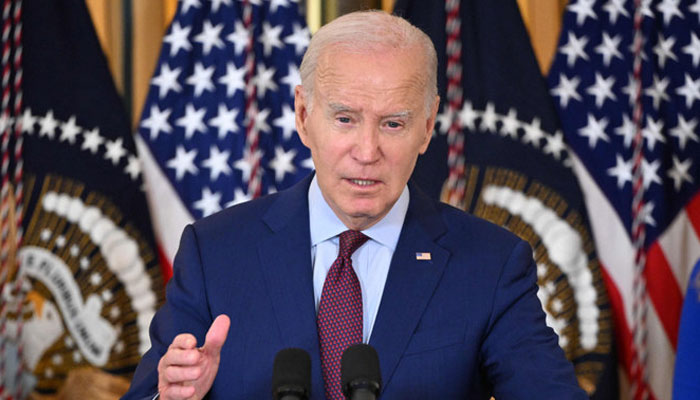A reset in ties?
Biden underscored shared priorities in areas such as public health, economic development, and education, affirming a commitment to advancing together
US President Joe Biden has pledged to stand by Pakistan’s new government in the challenges facing the country and the region. In his first letter written to Prime Minister Shehbaz Sharif, Biden emphasized the importance of the partnership between the two nations in ensuring regional and global security. Biden underscored shared priorities in areas such as public health, economic development, and education, affirming a commitment to advancing together. He also expressed Washington’s desire to strengthen the alliance with Pakistan. This first diplomatic outreach is being seen as a sign of a thawing in relations that had gone cold after the cipher controversy stirred up by former premier and PTI founder Imran Khan before a successful vote of no-confidence ousted his government two years ago in April 2022. Responding to Biden’s letter, PM Shehbaz has said Pakistan desired to work with the US for the achievement of shared goals of global peace and stability, and regional progress and prosperity.
For the last 75 years, diplomatic relations between Pakistan and the US have seen many ups and downs, in particular due to the regional situation related to Afghanistan – first during the Afghan jihad and later in the war on terror. In the aftermath of the US withdrawal from Afghanistan, Pak-US relations saw a frostiness that was different from the usual carrot-and-stick policy the US had adopted towards Pakistan during the war on terror for almost two decades. US President Joe Biden did not call former PM Imran Khan for months after taking charge, something that was discussed frequently when Imran Khan was in power. Some blamed this on Pakistan’s support of the Afghan Taliban over the years while others believed that apart from Pakistan’s support of the Afghan Taliban, the way the Imran government came out in support of the Afghan Taliban had agitated the superpower. Imran Khan’s statement that the Afghans broke the ‘shackles of slavery’ did not help ties either. During the last months of Imran’s government, the relationship between the two countries soured. After the vote of no-confidence, Imran’s allegations regarding the cipher, US Assistant Secretary of State Donald Lu, and the alleged role of the US in a ‘foreign conspiracy’ to oust his government led to further tensions between the two countries.
The previous PDM government did make efforts to reset the relationship. Former foreign minister Bilawal Bhutto-Zardari’s 16-month tenure did help rebuild the relationship to some extent and now that a new government is in place after the general elections, Biden’s letter is being seen as an outreach opportunity to reset the ties in the long run. Many experts believe that the real test will be Pak-China relations as it is no secret that when it comes to CPEC, the US has its reservations because of China’s growing influence in South Asia. These reservations are not going anywhere, given that global powers keep their own interests foremost, but Pakistan needs to maintain a healthy relationship with its longtime partner China while also having a grip on ties with the US. Pakistan’s relationship with China cannot be held hostage due to any country and the Shehbaz-led government acknowledges China’s important role in the region. China has been with Pakistan through thick and thin while the US is one of Pakistan’s largest export destinations apart from holding an important role due to its role as a superpower. This is a balancing dance every government is expected to perform. Our future lies in how well our governments do in this intricate dance of balance.
-
 ChatGPT Caricature Prompts Are Going Viral. Here’s List You Must Try
ChatGPT Caricature Prompts Are Going Viral. Here’s List You Must Try -
 James Pearce Jr. Arrested In Florida After Alleged Domestic Dispute, Falcons Respond
James Pearce Jr. Arrested In Florida After Alleged Domestic Dispute, Falcons Respond -
 Cavaliers Vs Kings: James Harden Shines Late In Cleveland Debut Win
Cavaliers Vs Kings: James Harden Shines Late In Cleveland Debut Win -
 2026 Winter Olympics Snowboarding: Su Yiming Wins Bronze And Completes Medal Set
2026 Winter Olympics Snowboarding: Su Yiming Wins Bronze And Completes Medal Set -
 Trump Hosts Honduran President Nasry Asfura At Mar-a-Lago To Discuss Trade, Security
Trump Hosts Honduran President Nasry Asfura At Mar-a-Lago To Discuss Trade, Security -
 Cuba-Canada Travel Advisory Raises Concerns As Visitor Numbers Decline
Cuba-Canada Travel Advisory Raises Concerns As Visitor Numbers Decline -
 Anthropic Buys 'Super Bowl' Ads To Slam OpenAI’s ChatGPT Ad Strategy
Anthropic Buys 'Super Bowl' Ads To Slam OpenAI’s ChatGPT Ad Strategy -
 Prevent Cancer With These Simple Lifestyle Changes
Prevent Cancer With These Simple Lifestyle Changes -
 Air Canada Flight Diverted St John's With 368 Passengers After Onboard Incident
Air Canada Flight Diverted St John's With 368 Passengers After Onboard Incident -
 Experts Reveal Keto Diet As Key To Treating Depression
Experts Reveal Keto Diet As Key To Treating Depression -
 Inter Miami Vs Barcelona SC Recap As Messi Shines With Goal And Assist
Inter Miami Vs Barcelona SC Recap As Messi Shines With Goal And Assist -
 David Beckham Pays Tribute To Estranged Son Brooklyn Amid Ongoing Family Rift
David Beckham Pays Tribute To Estranged Son Brooklyn Amid Ongoing Family Rift -
 Jailton Almeida Speaks Out After UFC Controversy And Short Notice Fight Booking
Jailton Almeida Speaks Out After UFC Controversy And Short Notice Fight Booking -
 Extreme Cold Warning Issued As Blizzard Hits Southern Ontario Including Toronto
Extreme Cold Warning Issued As Blizzard Hits Southern Ontario Including Toronto -
 Lana Del Rey Announces New Single Co-written With Husband Jeremy Dufrene
Lana Del Rey Announces New Single Co-written With Husband Jeremy Dufrene -
 Ukraine-Russia Talks Heat Up As Zelenskyy Warns Of US Pressure Before Elections
Ukraine-Russia Talks Heat Up As Zelenskyy Warns Of US Pressure Before Elections




